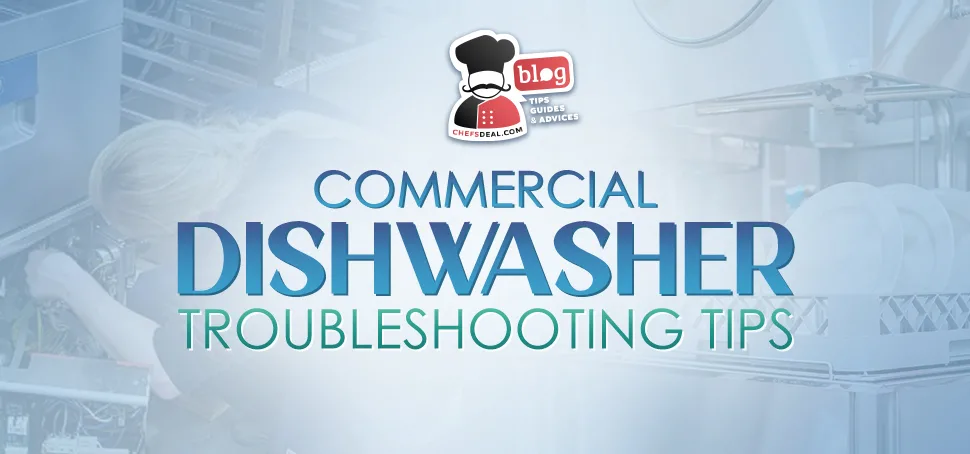Are you tired of dealing with a commercial dishwasher that seems to have a mind of its own? You know the frustration all too well—dirty dishes piling up, customers waiting, and your staff getting stressed.
Whether it’s unexpected leaks, persistent error codes, or dishes that simply aren’t coming out clean, these hiccups can disrupt your business. But don’t worry; you’re not alone in this battle. Understanding and troubleshooting common dishwasher issues can save you time, money, and a lot of headaches.
In this guide, you’ll discover practical solutions to keep your dishwasher running smoothly, ensuring your kitchen operates without a hitch. Ready to dive in and get your dishwasher back in top shape? Let’s tackle those problems together!

Credit: quickservant.com
Common Dishwasher Issues
Identifying common dishwasher issues in commercial settings can save time and money. Problems like drainage blockages, detergent residue, or overheating often occur. Regular maintenance and quick troubleshooting keep dishwashers running smoothly, ensuring efficient operations.
When your commercial dishwasher starts acting up, it can be frustrating. These machines are essential in keeping your kitchen running smoothly. Understanding common dishwasher issues can save you time and money.Dishes Not Cleaning Properly
Is your dishwasher leaving behind food particles or stains? This is a common problem that can be easily fixed. First, check the spray arms for clogs. Over time, bits of food can block these arms, preventing water from reaching all your dishes. Make sure you’re using the right detergent. Some cheaper options might not dissolve well in hard water. Adjusting the water temperature can also help—hotter water dissolves detergents better and cleans more effectively.Dishwasher Not Draining
Have you ever opened your dishwasher to find a pool of water at the bottom? This could be due to a clogged drain or filter. Regularly cleaning these parts can prevent this issue. Inspect the drain hose for kinks or blockages. A simple adjustment can often solve the problem. If the issue persists, it might be time to consult a professional.Strange Noises During Operation
Does your dishwasher sound like it’s trying to communicate in Morse code? Unusual noises can be a sign of something amiss. Loose dishes or utensils can sometimes cause rattling sounds. Check the spray arms to ensure they’re not hitting anything. If the noise is more mechanical, it could be a sign of a worn-out motor or pump. Early detection and repair can prevent further damage. Have you encountered any of these issues before? Share your experiences and solutions in the comments. Your insights could help someone else troubleshoot their dishwasher woes.
Credit: partsfe.com
Quick Fixes For Cleaning Problems
Commercial dishwashers are workhorses in any bustling kitchen. But even the best machines can run into cleaning problems. Luckily, there are quick fixes that can get you back on track without a hitch. Let’s dive into some practical solutions to common cleaning issues.
Checking Spray Arms
Clogged spray arms can be a silent saboteur in your dishwasher. Remove the spray arms and inspect the holes for any blockages. A simple poke with a toothpick or a good rinse can do wonders. It’s surprising how often a small piece of food can cause big headaches.
Using The Right Detergent
Not all detergents are created equal. Are you using one recommended for commercial use? Ensure your detergent is powerful enough to handle your daily load. Using the wrong type can lead to unsatisfactory results.
Inspecting Filters
Dirty filters can prevent your dishwasher from performing at its best. Regularly check and clean your filters to avoid residue buildup. If you’ve never checked them, now might be the perfect time. A clean filter equals sparkling dishes.
Ever faced a cleaning problem and felt stumped? Remember, small tweaks often lead to big improvements. What’s your go-to fix for dishwasher dilemmas?
Resolving Drainage Issues
Dealing with drainage issues in a commercial dishwasher can be frustrating. These problems often disrupt the flow of kitchen operations. Understanding the root cause is key to a quick fix. It might be a clogged hose or a faulty pump. This guide will help you tackle these issues efficiently.
Clearing Drain Hose
A clogged drain hose can stop water from exiting the dishwasher. Start by disconnecting the hose from the machine. Check for any visible blockages inside the hose. Use a long brush to remove debris. Rinse the hose with water to ensure it’s clear. Reattach the hose securely before testing the dishwasher.
Checking Drain Pump
The drain pump helps expel water from the dishwasher. If the machine doesn’t drain, inspect the pump. Remove the dishwasher’s access panel to locate the pump. Check for any obstructions around the pump. Also, examine the impeller for damage. Replace the pump if it doesn’t function properly.
Inspecting Air Gap
An air gap prevents backflow into the dishwasher. It sits on the sink or countertop. Check the air gap for clogs if drainage is slow. Remove the cap and clean any debris inside. Use a brush or toothpick for thorough cleaning. Ensuring the air gap is clear aids proper drainage.
Addressing Unusual Noises
Unusual noises in commercial dishwashers often signal underlying issues. Identifying the source helps in effective troubleshooting. Regular maintenance and prompt attention prevent costly repairs.
Addressing unusual noises from a commercial dishwasher can be daunting. These sounds often signal underlying issues. Ignoring them might lead to bigger problems. Regular maintenance keeps your machine running smoothly. In this section, we’ll explore common causes of strange noises. Simple checks and fixes can often solve the problem.Tightening Loose Parts
Loose parts often cause rattling or clinking noises. Start by inspecting the dishwasher’s interior. Check racks, spray arms, and door latches. Tighten any loose screws or bolts. Sometimes, parts may wear out, needing replacement. Regular checks prevent these issues.Inspecting Motor And Bearings
The motor is the heart of the dishwasher. A worn-out motor or bearings produce grinding sounds. Listen carefully when the machine operates. If you hear grinding, inspect the motor. Replace worn bearings immediately. This prevents further damage and costly repairs.Checking For Foreign Objects
Foreign objects often cause strange noises. Small items like cutlery or broken glass can get stuck. Check the bottom of the dishwasher. Remove any debris or foreign objects. This simple step can stop unusual noises. Regular cleaning prevents objects from causing damage.Handling Door And Seal Problems
Addressing door and seal issues in commercial dishwashers is crucial for efficiency. Leaks can lead to water waste and damage. Regular checks ensure seals are intact, preventing costly repairs and maintaining hygiene standards.
Dealing with door and seal issues in a commercial dishwasher can be a bit daunting, but it’s crucial for maintaining efficiency. A faulty door or seal can lead to leaks, affecting the machine’s performance and possibly causing damage to your kitchen floor. Tackling these problems head-on ensures your dishwasher runs smoothly, saving you time and money.Examining Door Latch
First, check if the door latch is clicking properly when you close it. A latch that’s not engaging might prevent the dishwasher from starting. If it feels loose or doesn’t click, tightening the screws or realigning the latch might solve the problem. Have you ever noticed how a simple click can make all the difference? You might even consider replacing the latch if adjusting doesn’t help. It’s a minor fix but can significantly impact your machine’s functionality.Replacing Door Gasket
A worn-out gasket is a common cause of leaks. Inspect the rubber seal around the door for any cracks or tears. These small damages can let water escape during a wash cycle. Replacing a gasket is easier than you might think. Remove the old one by gently pulling it out and press the new gasket into the groove. Make sure it fits snugly to prevent any leaks.Ensuring Proper Alignment
Misalignment can cause the door not to close properly, leading to leaks. Check if the door is even with the rest of the unit. A simple adjustment might correct any alignment issues. Use a level to ensure the dishwasher itself is not tilted, which can affect door alignment. Adjust the leveling feet if necessary. Have you ever realized how a small tilt can cause so much trouble? By addressing these common door and seal issues, you’re ensuring your commercial dishwasher remains a reliable kitchen asset. What minor adjustment could you make today to enhance your dishwasher’s performance?Managing Water Temperature Issues
Commercial dishwasher troubleshooting often involves managing water temperature issues. Incorrect temperatures can affect cleaning results and machine efficiency. Regular checks and adjustments ensure optimal performance and hygiene standards.
Managing water temperature issues in your commercial dishwasher can often feel like a daunting task. However, ensuring the right temperature is crucial for effective cleaning and sanitization. If you’ve ever pulled out dishes only to find them less than sparkling, it might be time to roll up your sleeves and dive into some troubleshooting.Testing Heating Element
A faulty heating element might be the culprit behind inconsistent water temperatures. Begin by checking the element for any visible signs of damage or corrosion. Use a multimeter to test for electrical continuity; if there’s no continuity, consider replacing it. Have you ever noticed your dishwasher taking longer than usual to heat up? This could be a telltale sign that the heating element is on its last legs. A quick test can save you hours of frustration down the line.Adjusting Thermostat
The thermostat regulates the water temperature, ensuring it stays within the optimal range. If your water isn’t hot enough, it might be time to adjust the thermostat settings. Locate the thermostat and use a screwdriver to tweak it to the desired temperature. Keep in mind that the ideal temperature for commercial dishwashers is typically between 150°F and 160°F. Have you considered the impact of too high or too low temperatures on your dishes? Too high can damage delicate items, while too low might not sanitize effectively.Ensuring Adequate Hot Water Supply
Sometimes, the issue isn’t within the dishwasher itself but rather in the water supply. Check if your hot water heater is functioning correctly and is set to an adequate temperature. A simple adjustment in the hot water heater settings can make a world of difference. Have you ever thought about the distance between your water heater and the dishwasher? Longer distances can result in heat loss, leading to cooler water reaching the machine. Insulating your pipes can help maintain the water temperature as it travels. By addressing these key areas, you can significantly improve your dishwasher’s performance. What steps will you take today to ensure your dishes come out spotless? Engage with your equipment, and don’t shy away from a little hands-on maintenance.Electrical And Power Concerns
Commercial dishwashers are vital in fast-paced kitchens. Electrical and power concerns can disrupt their efficiency. Identifying and addressing these issues quickly is crucial. Understanding the basics of electricity can help avoid costly repairs. This section covers essential troubleshooting steps.
Inspecting Power Connection
Ensure the dishwasher is plugged in securely. Loose connections can cause power failures. Check the power cord for any visible damage. Replace damaged cords immediately. Inspect the outlet for signs of wear or burns. This indicates potential electrical problems.
Checking Circuit Breakers
Locate the circuit breaker panel. Ensure the breaker for the dishwasher is not tripped. Reset the breaker by switching it off, then on. Persistent tripping requires professional assessment. Avoid overloading circuits with multiple appliances.
Testing Control Panel
Examine the control panel for unresponsive buttons. This can indicate electrical issues. Check for any display error codes. Refer to the user manual for code meanings. Faulty panels may need replacement or repair by a technician. Regular maintenance helps prevent control panel failures.

Credit: www.chefsdeal.com
Maintenance Tips For Longevity
Maintaining a commercial dishwasher is crucial for ensuring its longevity and consistent performance. A well-maintained dishwasher not only saves you money on repairs but also ensures your dishes are sparkling clean every time. Imagine never having to deal with unexpected breakdowns during peak business hours. The key to this peace of mind is regular maintenance. Here are some tips to keep your commercial dishwasher running smoothly for years.
Regular Cleaning Schedule
Cleaning your dishwasher regularly is vital. Residue from detergents and food particles can build up over time, affecting performance. Dedicate time every week to clean filters, spray arms, and the interior. A simple wipe-down can prevent stubborn grime from settling in. Remember, a clean dishwasher is an efficient dishwasher.
Routine Inspections
Routine inspections help you catch small issues before they become costly repairs. Check for leaks, unusual noises, and any signs of wear. Have you ever noticed a slight drip or a strange sound? It’s your dishwasher’s way of asking for attention. Regular inspections can save you from major headaches down the line.
Replacing Worn Parts
Parts of your dishwasher will wear out over time. Keep an eye on components like seals, gaskets, and spray arms. If you notice any damage or wear, replace them promptly. Waiting too long can lead to bigger problems, like water damage or inefficient washing. Would you rather deal with a minor replacement or a major repair?
Maintaining your commercial dishwasher doesn’t have to be a chore. With these tips, you can ensure your equipment lasts longer and performs better. How do you keep your dishwasher in top condition?
Frequently Asked Questions
Why Is My Dishwasher Not Cleaning Dishes Properly?
Check spray arms for blockages. Ensure water temperature is 120°F. Verify detergent quality and quantity. Examine filters for clogs.
What Causes A Dishwasher To Leak Water?
Inspect door seal for damage. Check hoses and connections. Ensure the dishwasher is level. Look for cracks in the tub.
How To Fix A Dishwasher That Won’t Start?
Ensure door is properly closed. Check power supply and circuit breaker. Inspect control panel for issues. Look for blown fuses.
Why Does My Dishwasher Make Loud Noises?
Examine spray arms for obstructions. Check pump for debris. Inspect motor bearings. Ensure dishwasher is properly installed and leveled.
What To Do If Dishes Come Out Still Wet?
Increase rinse aid usage. Verify water temperature is 120°F. Check drying settings. Ensure proper loading of dishes for airflow.
Conclusion
Solving dishwasher issues need not be stressful. Regular checks prevent major problems. Clean filters often. Inspect spray arms for clogs. Ensure connections are tight. Listen for unusual sounds. Address them promptly. Keep manuals handy for guidance. Consult professionals when needed.
Proper maintenance extends dishwasher life. Saves money too. Understanding common faults aids in quick solutions. Reliable operation is key for business success. Stay proactive in care. Enjoy a smoother kitchen experience. Troubleshooting empowers you with skills. Trust your instincts and keep learning.
Your kitchen runs smoothly with a well-maintained dishwasher.






